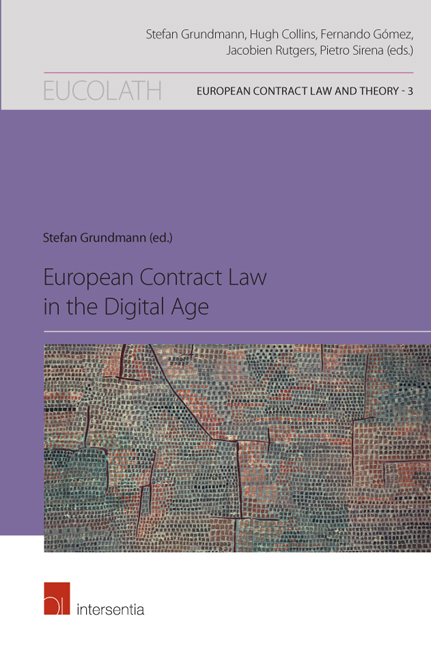Book contents
- Frontmatter
- Contents
- Table of Cases
- List of Authors
- PART I The Overall Architecture
- Part II Institutional Framework – Platforms, Regulation Issues, Global Surroundings
- Part III Digital Formation of Contract – More Virtual and More Formalised
- Part IV Development and Implementation of Contract – More Digital, More Liquid
- Part V Digital Objects of Contract – CESL II and More
- Contracts for the Supply of Digital Content – The proposal of the commission for a directive on contracts for the supply of digital Content
- Digital Content – A Digital CESL II – A Paradigm for Contract Law via the Backdoor?
- Index
- European Contract Law and Theory Series
Digital Content – A Digital CESL II – A Paradigm for Contract Law via the Backdoor?
from Part V - Digital Objects of Contract – CESL II and More
Published online by Cambridge University Press: 11 October 2018
- Frontmatter
- Contents
- Table of Cases
- List of Authors
- PART I The Overall Architecture
- Part II Institutional Framework – Platforms, Regulation Issues, Global Surroundings
- Part III Digital Formation of Contract – More Virtual and More Formalised
- Part IV Development and Implementation of Contract – More Digital, More Liquid
- Part V Digital Objects of Contract – CESL II and More
- Contracts for the Supply of Digital Content – The proposal of the commission for a directive on contracts for the supply of digital Content
- Digital Content – A Digital CESL II – A Paradigm for Contract Law via the Backdoor?
- Index
- European Contract Law and Theory Series
Summary
ABSTRACT
This chapter critically examines some features of the proposed directive on sale of digital content, namely its scope of application, defects with respect to digital contents, the contract term, remedies for breach of contract and the right to redress. These aspects are compared with general contract law. The chapter concludes that the nature of digital content does not necessitate any special legislation and will likely contribute to more confusion than clarification. Thereby the proposed directive will be detrimental to cross-border transactions.
INTRODUCTION
The EU Commission has an ambition to create directives and regulations. Sometimes the ambition appears to be more to do something, than to do good. Directives and regulations are oft en too narrow, too detailed, too shallow and too fragmented. The proposed directive on sale of digital content (adopted by the EU Commission in December 2015) is an example of this. I doubt that the proposed directive will facilitate EU cross-border transactions; instead I fear that it will create greater hindrance.
EXAMPLES OF SALE OF DIGITAL CONTENTS AND THE SCOPE OF APPLICATION
There are many examples of sale of digital content:
– Streaming services of film, books and music;
– ‘Cyberbutler’ services;
– Dating services;
– Gambling (expressly not covered by the proposed directive if they involve wagering a stake with monetary value, Article 5(c));
– E-learning products;
– Networking products (Facebook, LinkedIn);
– Accounting/book-keeping products;
– News subscriptions;
– Storage of digital material (cloud services);
– Healthcare services (healthcare services as defined in Article 3 of Directive 2011/24/EU are not covered by the proposed directive);
– Fitness services;
– Financial services (expressly not covered by the proposed directive);
– Subscription for contracts and other template documents adapting in response to users ’ answers to questions posed.
Generally, the proposed directive’ s scope of application is hard to discern.
The proposed directive covers also non-electronically stored data. This may entail a huge scope of application. The proposed directive does not, however, cover embedded digital content, which implies a huge carve out from the application. It is very hard to understand the concept of embedded digital content and consequently to understand when the proposed directive is applicable.
The proposed directive does not apply to personal (physical) services. The distinction between purely digital services and services that consist partly of physical services is becoming increasingly blurred as new products are invented. There is no reason to have different legal regimes for the two situations.
- Type
- Chapter
- Information
- European Contract Law in the Digital Age , pp. 315 - 328Publisher: IntersentiaPrint publication year: 2018

